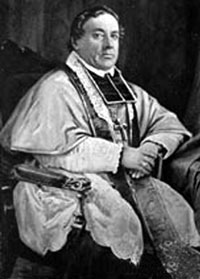Born: Nicolet, Lower Canada, February 12, 1787.
Priestly ordination: December 21, 1811.
Episcopal ordination: May 12, 1822.
Died: Saint-Boniface, Manitoba, June 7, 1853.
Joseph Norbert Provencher was born in Nicolet on February 12, 1787. His parents were Jean-Baptiste Provencher, a farmer, and Élisabeth Proulx. He entered the minor seminary in Nicolet 1804 and studied theology in Montreal, in Nicolet and in Quebec between 1808 and 1811, while at the same time teaching in the minor seminary.
He was ordained to the priesthood on December 21, 1811 and in the following years he was assistant priest in Quebec cathedral, then in Vaudreuil, and later in Deschambault. He then became pastor in Saint-Joachim, Pointe-Claire (1814-1816) and Kamouraska (1816-1818). In 1818 Bishop Plessis of Quebec appointed him vicar general as missionary in Red River, where Lord Selkirk, a shareholder in the Hudson Bay Company, had established a colony where the Assiniboine joined Red River. The mission assigned to him by Bishop Plessis was “the conversion of the native peoples scattered over this vast territory” and ministry to “those bad Christians who had adopted the customs of the natives”. In 1821 this colony numbered 1,290 inhabitants: whites and half-breeds, Catholics and Protestants; by 1843, there were 5,143. Father Provencher built a modest residence and a church on the eastern bank of the Red River, on a site named Saint-Boniface.
Even before he sent Father Provencher to the West, Bishop Plessis knew that a bishop would have to be appointed in the Northwest. During a visit to London and Rome, in 1891, he obtained from the Pope a bull dated February 1, 1820, appointing Father Provencher auxiliary bishop for the West. The newly elected bishop was ordained in Trois-Rivières on May 12, 1822 with the title of Juliopolis. This missionary district was to be made the apostolic vicariate of James Bay on April 16, 1844, and then a diocese on June 4, 1847. It was at first given the title of diocese of Northwest and then of Saint-Boniface in 1851. Whether as a simple missionary or as bishop, Bishop Provencher promoted the education of young people by opening a number of schools. He encouraged colonization, struggled to improve the customs of the Whites and promoted the conversion of the Indians. During the first fifteen years of his episcopacy, he had scarcely more than fifteen collaborators. They were diocesan priests who seldom remained more than a few years. In 1843 he set out for Lower Canada and Europe in the hope of recruiting some religious men and women. In Montreal, thanks to Bishop Bourget, he found some of the Sisters of Charity of Montreal. In Marseilles he met with Bishop Eugene de Mazenod who promised him some Oblates of Mary Immaculate. The first two, Fathers Pierre Aubert and Alexandre Taché, were to arrive in Red River in the summer of 1845.
Father Guigues, superior of the Oblates in Canada, had hesitated to send these two missionaries. Bishop de Mazenod had to write him some urgent letters, especially those of December 5, 1844, and May 24, 1845. In the first of these, he wrote: “We must have courage and trust in God who is pointing out the way to us and who will not abandon us when we take it in his name and for his glory.” Everywhere that we are established, the beginnings have been weak. So, let me repeat, do not hesitate to respond to the wishes of the bishop of Juliopolis, and begin the work, even with two men, while awaiting others who will come through the goodness of God.” On May 24, 1845, he added: “You keep on rationalizing unceasingly when there is nothing more to discuss and I have made a most formal declaration. You should know, however, that such an attitude is inadmissible, with us as with any well-ordered congregation, because it is contrary to the principles of order and obedience. It is even less so in the present matter because of the grave inconvenience that would be the result of it.”
Two other missionaries left for Saint-Boniface in 1846: Fathers Henri Faraud and François Bermond. These first missionaries travelled further and further to the Northwest to explore and to meet the Indians. Bishop de Mazenod was worried about their isolation and their lack of community life. He considered recalling them when, in June 1850, Father Taché, aged 28 years, was appointed titular bishop of Arath and coadjutor of Bishop Provencher. On November 26, 1851, the new bishop was ordained in Viviers by Bishop de Mazenod. He returned immediately to Saint-Boniface with three missionaries: Fathers Henri Grollier, René Rémas and Valentin Végréville. Others were to follow regularly in the years ahead.
Bishop Provencher died in Saint-Boniface on June 7, 1853. Before his death he was able to see that he had not laboured in vain. There were three parishes for Whites and half-breeds. In that if Saint-Boniface there were 1,000 Catholics and there were three Indian missions (Lac Sainte-Anne not far from Fort Edmonton, Saint-Jean Baptiste in Île-à-la-Crosse, and La Nativité at Lake Athabaska.
Yvon Beaudoin, o.m.i.

